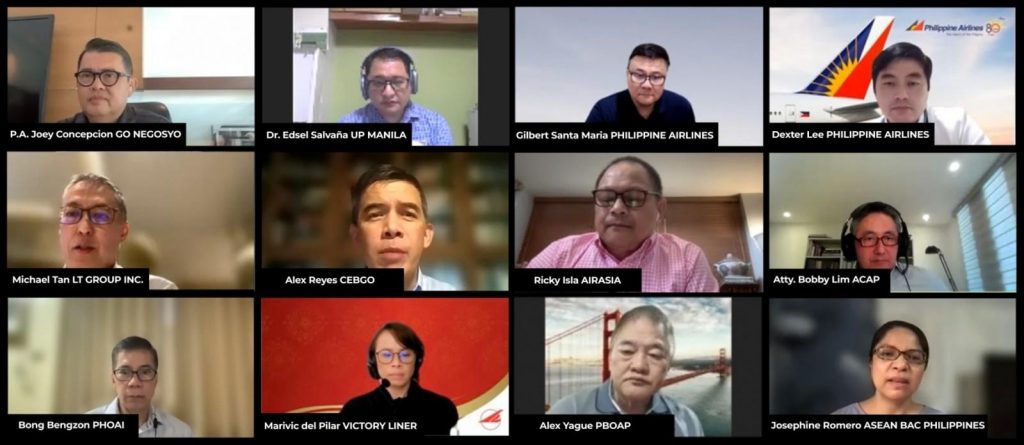
Overly stringent travel requirements imposed by both national and local governments
amid the prolonged COVID-19 pandemic could lead to the eventual crash of the local
aviation industry.
Major airline groups have thus asked the government to allow increased mobility of
vaccinated Filipinos to allow them to sustain the recovery of some of the billions of
pesos in revenues lost since the COVID-19 pandemic struck in March 2020.
These airline groups sought the help of Presidential Adviser for Entrepreneurship Joey
Concepcion in bringing forward their concerns regarding the effects of the pandemic on
their businesses to the national government.
Collectively, they have asked for increased mobility among the vaccinated within the
transport sector.
“For these airline companies to survive, there has to be sustainable number of
passengers especially for the tourism industry,” Concepcion said.
Concepcion and the stakeholders of the airline sector met with Dr. Edsel Salvana, one
of the advisers of the DOH, to air their concerns over the strict policies of both the
national and local governments that discourage travelers from flying to various parts of
the country or even abroad.
Stakeholders called on the government to relax some rules to help encourage Filipinos
to travel, especially those who are fully vaccinated.
Among these rules that they hope can be done away with are the multiple requirements
for traveling, especially for domestic destinations, and expensive testing as most
destinations require an RT-PCR test, and the long quarantines for arriving passengers
from international flights.
When it comes to international flights, Philippine Airlines, represented by President and
COO Gilbert Sta. Maria and Senior Vice President and Chief Strategy and Planning
Officer Dexter Lee, said travelers consider requirements such as testing and the 10-day
quarantine period very burdensome, forcing them to put off their travel plans.
Philippine Airlines, for its part, proposed piloting a new protocol to reduce risk and cost
to passengers of international flights.
Under the proposal, passengers will be tested 72 hours before departure and will
undergo quarantine upon arrival and take an RT-PCR test on the third day. If the result
is negative, they can go out of the quarantine facility on the 5th day and continue home
quarantine.
Based on the data presented, testing before departure helps reduce positivity rate and
risk. The proposal would also enable passengers to save as much as 25,000 pesos
aside from enjoying a more comfortable quarantine in the comfort of their own home.
The stakeholders also requested the IATF to consider placing North America on the list
of green countries as this is the biggest market for local airlines. According to PAL, it
has earned $1 billion from the North American market before the pandemic.
Cebu Pacific, through its Vice President for Cargo Alex Reyes, also called on the Inter-
Agency Task Force (IATF) to release guidelines to allow fully vaccinated Filipinos to
travel domestically to help start tourism and economic activities.
“They only must present a vaccination card or DICT vaccination certificate as sole
requirement” said Reyes, adding local government units may require RT-PCR test for
unvaccinated travelers.
Meanwhile, Air Asia CEO Ricky Isla proposed the use of antigen testing if testing will
still be required as it is more convenient and cheaper.
The proposal is similar to the Bakuna Bubble being pushed by Concepcion.
Under the Bakuna Bubble, COVID-19 guidelines are eased for fully vaccinated
individuals to help boost the economy and protect the employment of many Filipinos.
Concepcion has been pushing for safer reopening of the economy specially for the
vaccinated, scoring some minor wins after some sectors were allowed to open during
the granular lockdown in the National Capital Region.
Salvana, on the other hand, said he’s supportive of the reopening of businesses but he
insisted that it must be done safely.
The airline industry also assured the IATF that they are well-equipped and prepared
because they have been doing these measures even before the COVID-19 pandemic.
The hotel industry, represented by Philippine Hotel Owners Association Executive
Director Bong Bengzon, asked the government to revisit the number of passengers who
are allowed to come in as they can handle the influx of tourists once the tourism
industry is opened.
The bus industry, for its part, was supportive of the call to allow intra/inter-provincial
travel for vaccinated individuals, saying it would help revive the sector that has been
heavily affected by lockdowns.
Keeping the airline industry healthy is also vital to the survival of hotels, travel agents
and operators, and tourism-related businesses, most of them small and medium
enterprises that are scattered all over the island nation.
Salvana committed to bring the concerns of the stakeholders to the IATF and would
take up their proposals during its next meeting.
“I understand the plight of the airline industry. I promise to put all of their concerns and
proposals on the table in our next meeting,” he said.
Aside from Concepcion, others who attended the meeting were LT Group President
Michael Tan, Cebu Pacific VP for Corporate Affairs Atty. JR Mantaring, Air Carriers
Association of the Philippines (ACAP) Executive Director Atty. Bobby Lim, MacroAsia
Corp. President and COO Joseph Chua, Victory Liner Senior VP Marivic Del Pilar, Alex
Yague of Nagkakaisang Samahan ng Nangangasiwa ng Panlalawigang Bus sa Pilipinas
Inc., Yvonne Flores of Cebu Pacific, Annabelle Arceo of LT Group, Rachel Jem Apoldo
of Air Asia, ASEAN BAC Philippines Senior Adviser Josephine Romero, and Go
Negosyo Executive Director Mina Akram.
